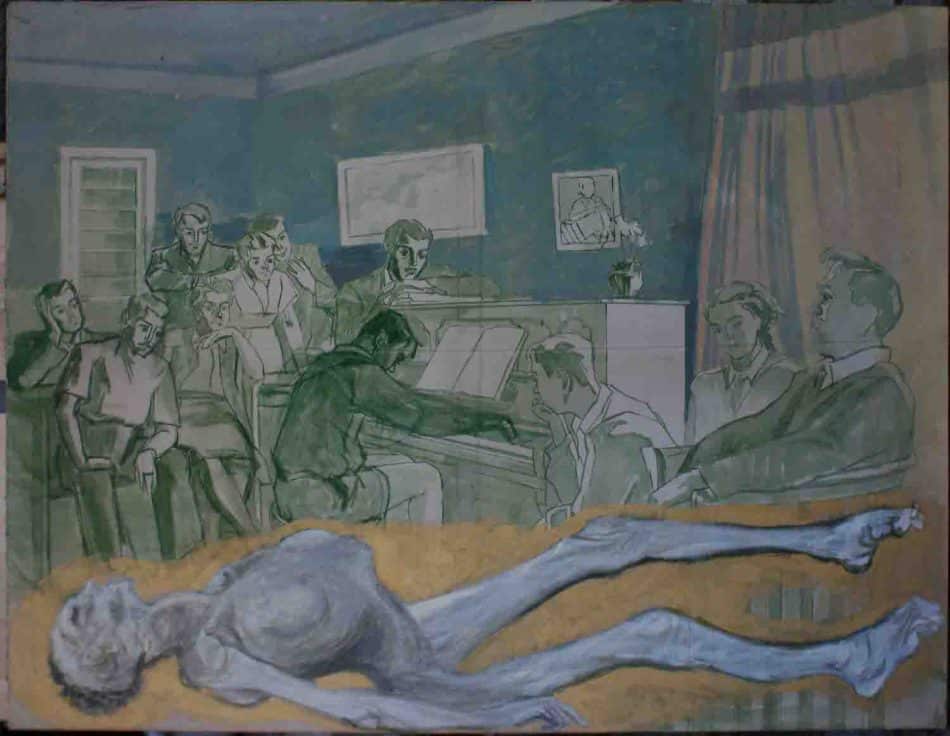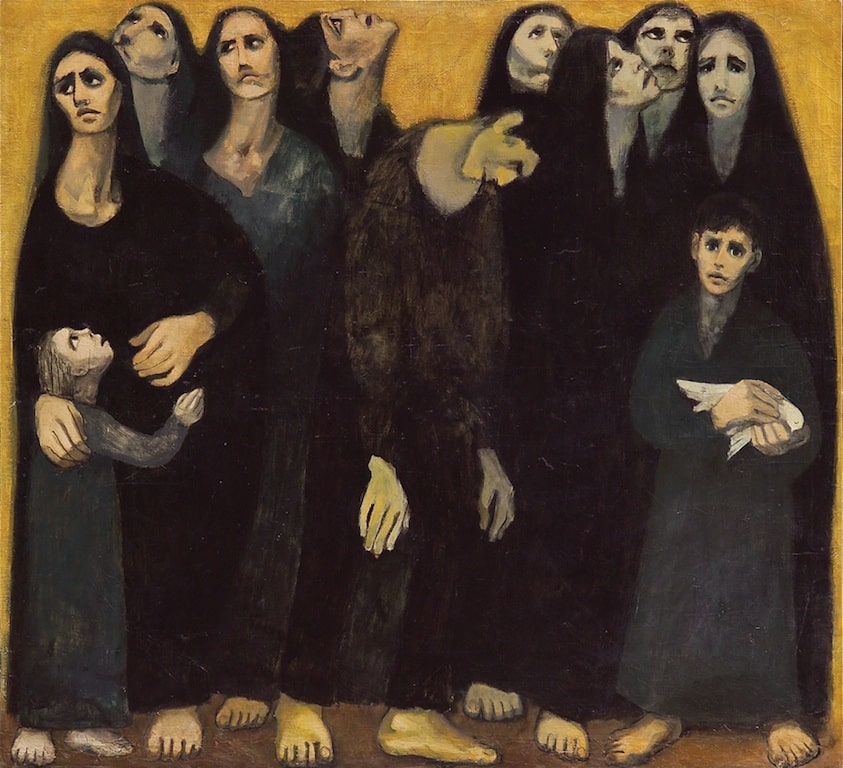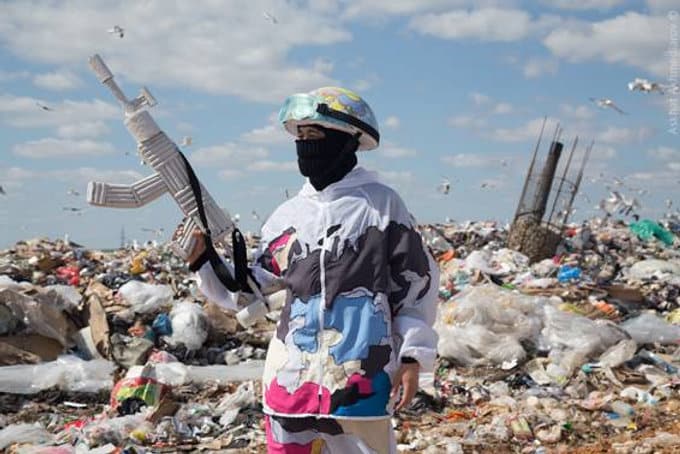Dear Friends,
Greetings from the desk of Tricontinental: Institute for Social Research.
On 13 September, at a conclave in Washington, DC, U.S. President Joe Biden and UK Prime Minister Keir Starmer indicated that it would be acceptable for Ukraine to fire missiles, provided by the West, into Russian territory. No official decision has been announced as of yet, but it is clear where the conversation among North Atlantic Treaty Organisation (NATO) member states is headed. After Starmer—whose approval rating with voters sits at 22%—returned to London, his foreign secretary David Lammy told the press that the UK government is in conversation with other allies about lifting restrictions on Ukraine’s use of UK-provided Storm Shadow missiles into Russia. Sir John McColl, a retired senior UK army officer, went further, stating that these missiles would eventually be used against Russia, yet—by themselves—they would not enable Ukraine to prevail. In other words, knowing full well that these missiles will not change the tenor of the war, these men (Biden, Starmer, and McColl) are willing to risk deepening the conflict.
Ukrainian President Volodymyr Zelenskyy has made the use of Western-provided missiles a central theme of his conversations with world leaders, claiming that if his military is allowed to fire the Storm Shadow missiles (from the UK), SCALPs (from France), and ATACMS (from the U.S.), then Ukraine will be able to hit Russian military bases on Russian soil. A greenlight by NATO to use these three missile systems, which have already been supplied to Ukraine by NATO member countries, would be a significant escalation: if Ukraine were to use these missiles to attack Russia, and Russia were to retaliate with an attack on the countries that provided the missiles, it would trigger Article 5 of the NATO charter (1949), drawing all NATO member countries directly into the war. In such a scenario, several nuclear powers (U.S., UK, France, and Russia) will have their fingers on the nuclear button and could very well take the planet down the path of fiery destruction.

Ion Grigorescu and Arutiun Avakian (Romania/Armenia), The Genius and the Era, 1990/1950s.
In December 2021, Russia and the United States held a series of consultations that, even at that late hour, could have prevented hostilities from breaking out in Ukraine. A summary of those discussions is vital to highlight the key issues underlying the conflict:
1. 7 December 2021. U.S. President Joe Biden and Russian President Vladimir Putin held a two-hour video conference. The White House readout, which is only a paragraph long, focused on Russian troop movements on the Ukrainian border. The Kremlin summary is a bit longer and introduced a point that the United States has ignored: ‘Vladimir Putin warned against the shifting of responsibility on Russia, since it was NATO that was undertaking dangerous attempts to gain a foothold on Ukrainian territory and building up its military capabilities along the Russian border. It is for this reason that Russia is eager to obtain reliable, legally binding guarantees ruling out the eventuality of NATO’s eastward expansion and the deployment of offensive weapons systems in the countries neighbouring Russia’.
2. 15 December 2021. Russian Deputy Foreign Minister Sergey Ryabkov met with U.S. Assistant Secretary of State for European and Eurasian Affairs Karen Donfried in Moscow. The Russian press release published after the meeting said that ‘they had a detailed discussion of security guarantees in the context of the persistent attempts by the U.S. and NATO to change the European military and political situation in their favour’.

Maria Khan (Pakistan), Craving for Love, 2012.
3. 17 December 2021. Russia released a draft treaty between itself and the United States as well as a draft agreement with NATO. Both texts made it clear that Russia was seeking firm security guarantees against any destabilisation of the status quo to its west. In these texts, there are explicit and important statements about missiles and nuclear weapons. The draft treaty says that neither the U.S. nor Russia should ‘deploy ground-launched intermediate-range and shorter-range missiles outside their national territories, as well as in the areas of their national territories, from which such weapons can attack targets in the national territory of the other Party’ (article 6) and that both sides should ‘refrain from deploying nuclear weapons outside their national territories’ (article 7). The draft agreement with NATO says that none of the NATO countries should ‘deploy land-based intermediate-and short-range missiles in areas allowing them to reach the territory of the other Parties’ (article 5).
4. 23 December 2021. In his annual press conference, Putin once more broadcast Russia’s anxiety about NATO’s eastward movement and about the threats of weapons systems being deployed on Russian borders: ‘We remember, as I have mentioned many times before and as you know very well, how you promised us in the 1990s that [NATO] would not move an inch to the East. You cheated us shamelessly: there have been five waves of NATO expansion, and now the weapons systems I mentioned have been deployed in Romania, and deployment has recently begun in Poland. This is what we are talking about, can you not see? We are not threatening anyone. Have we approached U.S. borders? Or the borders of Britain or any other country? It is you who have come to our border, and now you say that Ukraine will become a member of NATO as well. Or, even if it does not join NATO, that military bases and strike systems will be placed on its territory under bilateral agreements’.
5. 30 December 2021. Biden and Putin had a phone call about the deteriorating situation. The Kremlin’s summary is more detailed than the one from the White House, which is why it is more useful. Putin, we are told, ‘stressed that the negotiations needed to produce solid legally binding guarantees ruling out NATO’s eastward expansion and the deployment of weapons that threaten Russia in the immediate vicinity of its borders’.
On 24 February 2022, Russian troops entered Ukraine.

Louay Kayyali (Syria), Then What?, 1965.
Russia has been anxious about its security guarantees ever since the United States began to unilaterally withdraw from the delicate arms control system. The bookends of this dismissal are the U.S.’s 2001 departure from the 1972 Anti-Ballistic Missile Treaty and 2019 revocation of the 1987 Intermediate-Range Nuclear Forces Treaty. The disposal of these treaties and the failure to acknowledge Russian pleas for security guarantees—alongside NATO aggressions in Yugoslavia, Afghanistan, and Libya—caused anxieties to grow in Moscow about the possibility that the West could place short-range nuclear missiles in Ukraine or in the Baltic states and be able to strike large Russian cities in the west without any hope of defence. That has been Russia’s main argument with the West. If the West had taken the treaties that Russia proposed in December 2021 seriously, then we might not be in a situation where the Western countries are discussing the use of NATO missiles against Russia.
A new study by the consulting firm Accuracy shows that arms companies in the United States and Europe have benefited enormously from this war, with stock market capitalisation for the main weapons companies having increased by 59.7% since February 2022. The largest gains were made by Honeywell (U.S.), Rheinmetall (Germany), Leonardo (Italy), BAE Systems (UK), Dassault Aviation (France), Thales (France), Konsberg Gruppen (Norway), and Safran (France). The U.S. companies Huntington Ingalls, Lockheed Martin, General Dynamics, and Northrup Grumman also saw gains, though their percentage increases were lower because their absolute profits were already at obscene levels. While these NATO merchants of death profit enormously, their populations continue to struggle with higher prices due to fuel and food price inflation.

Askhat Akhmedyarov (Kazakhstan), Geopolitical Soldier, 2014.
Perhaps the most cruelly ironic part of this entire debate is that allowing Ukraine to strike Russia would not necessarily result in any military benefit. Firstly, Russian air bases have now moved out of range of the missiles under discussion, and, secondly, Ukrainian supplies of these missiles are low. Adding to the looming threat of nuclear war are two recent statements from the U.S. In August, the U.S. press reported that the Biden administration had produced a secret memorandum about preparing the U.S. nuclear arsenal to combat China, North Korea, and Russia. This came on the heels of another report, in June, that the U.S. is considering expanding its nuclear forces.
All of this is part of the backdrop of the 79th United Nations General Assembly meeting taking place this month, where member states will discuss a new Global Compact. The draft compact uses the word ‘peace’ over a hundred times, but the real noise we hear is war, war, war.

Tuvshoo (Mongolia), Tears of Joy, 2013.
When I was a teenager in Calcutta, India, I would often zip off to the Gorky Sadan theatre and watch the films of the Soviet director Andrei Tarkovsky, which ruminated about life and the human desire to be better. One of these films, Mirror (1975), about the outrageousness of war, is anchored in the poems of the filmmaker’s father, Arseny Tarkovsky. As tensions rise in Ukraine, the elder Tarkovsky’s poem ‘Saturday, June 21’ (referring to the day before the Soviet Union was attacked by Nazi Germany 1941) warns us against mounting threat of war:
There’s one night left to build fortifications.
It’s in my hands, the hope for our salvation.I’m yearning for the past; then I could warn
Those who were doomed to perish in this war.A man across the street would hear me cry,
‘Come here, now, and death will pass you by’.I’d know the hour when the war would strike
Who will survive the camps and who will die.Who will be heroes honoured by awards,
And who will die shot by the firing squads.I see the snow in Stalingrad, all strewn
With corpses of the enemy platoons.Under the air raids, I see Berlin
The Russian infantry is marching in.I can foretell the enemy’s every plot
More than intelligence of any sort.And I keep pleading, but no one will hear.
The passersby are breathing in fresh air,Enjoying summer flowers in June,
All unaware of the coming doom.Another moment—and my vision disappears.
I don’t know when or how I ended here.My mind is blank. I’m looking at bright skies,
My window not yet taped by criss-crossed stripes.
Warmly,
Vijay

